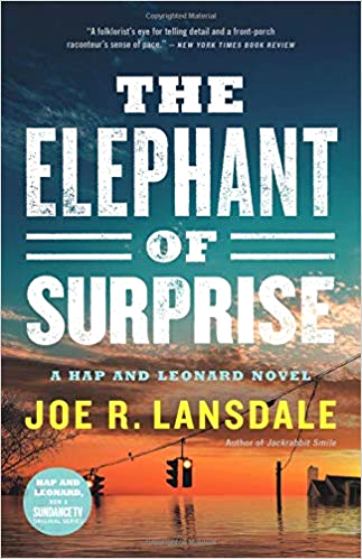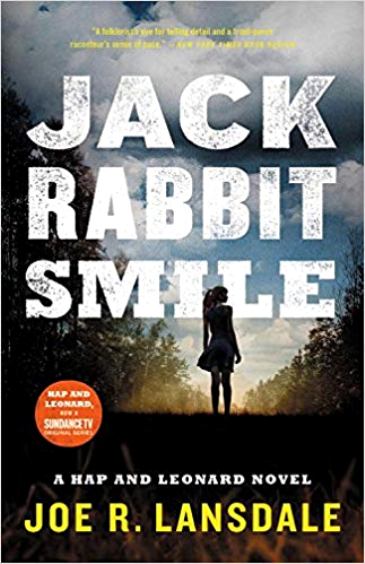

On this month's Special Page:
Joe R. Lansdale is back with even more writing tips
IN THE "SPECIAL PAGE" ARCHIVES:
Christian A. Larsen
Marc Ciccarone
Mylo Carbia
John Kachuba
John Russo
Andy Weir
Write like everything is alive
by Joe R. Lansdale
A writerly tip that works for me and may work for you. Write like everything is alive. Rocks, trees, cars, you name it. They don't have to talk or ask directions (optional), but by thinking of objects that way you write more descriptively. Not that you should overdo it. Writers I feel did that well were Ray Bradbury and Raymond Chandler. There are others, but they jump to mind. It gives the work a more painterly, or cinematic feel if you think of things, even things that don't move, as alive.
I find that less is more when it comes to writing hours. Three is about it for me, and that way I'm not worn out the next day, and I keep adding to the story because I know I'll have a short time to work. It stays fun most of the time and a lot more satisfying, and I get to feel like a hero everyday because I've worked with enthusiasm. Working my ass off for twelve hour a day just gives me dread of doing it, but knowing I only have to show up for about three hours, write three to five pages a day.
I often find I write a larger number of pages than that, and I stay excited about the work. I find if the three to five pages come quickly, and I just don't feel up to working longer, I quit, even if it isn't three hours, because I know I've done my quota. Next day I might get ten pages in three hours, and often do because I'm invested in the story. It excites me and satisfies me. It's my method, and it might be helpful to others, and maybe not, but there it is if you want to consider it.
Sometimes writing works best when you create a fine opening line that deals with a character. You are forced to understand why a character would act the way you have had them act in that line. It's one line, but it can open up a whole vault of ideas about that character, and the excitement of knowing the character's motivation for murder, singing a song, or whatever, even if you don't use it all in the story, gives you confidence to proceed. Each character does what they do for a reason other than serving the plot. They shouldn't be chess pieces you're pushing around to get to the end of the story. The story has to develop out of who they are and what they would do because of their life experience.
I don't do this anymore, but when I first started writing, my wife would pick interesting stories from the newspapers and I would pick a couple that were especially interesting to me and try to figure how they could somehow be related. It helped me think about how you could take seemingly unrelated ideas and make a story out of them. In the long run I found this too artificial, but it helped me learn to construct stories. Now I don't think about it at all or use this method, but I think I learned a lot from it.
When I first started out writing, there were a lot more markets, I give it that. And advantage, for sure. I wrote 90 stories in 90 days, and they were all awful. I learned a lot doing it. Over a four year period, and again, you could send one story to ten markets or so a piece, I learned about persistence, and a few helpful comments from editors along the way didn't hurt. When it was done, I was looking at around 1,000 rejections in that four year time for those 90 stories. By then I was selling stories, but that taught me a lot. I also learned how to get all the crap out of my system, or most of it. A lot of words, a lot of rejects, led to becoming a better writer, and in time, it led to finding my natural voice by divesting myself of all the other voices that had collected inside my head for so many years. But those voices taught me a lot, as did rejection.
About Joe R. Lansdale
Champion Mojo Storyteller Joe R. Lansdale has written novels and stories in many genres, including Western, horror, science fiction, mystery, and suspense. He has also written for comics as well as "Batman: The Animated Series." As of 2018, he has written 45 novels and published 30 short-story collections along with many chapbooks and comic-book adaptations. His stories have won ten Bram Stoker Awards. a British Fantasy Award, an Edgar Award, a World Horror Convention Grand Master Award, a Sugarprize, a Grinzane Cavour Prize for Literature, a Spur Award, and a Raymond Chandler Lifetime Achievement Award. He has been inducted into The Texas Literary Hall of Fame, and several of his novels have been adapted to film.
Frequent features of Lansdale's writing are usually deeply ironic, strange or absurd situations or characters, such as Elvis Presley and John F. Kennedy battling a soul-sucking Egyptian mummy in a nursing home (the plot of his Bram Stoker Award-nominated novella, Bubba Ho-Tep, which was made into a movie by Don Coscarelli). He is the winner of the British Fantasy Award, the American Horror Award, the Edgar Award, and ten Bram Stoker Awards.
His Hap and Leonard series of ten novels, four novellas, and three short-story collections feature two friends, Hap Collins and Leonard Pine, who live in the fictional town of Laborde, in East Texas, and find themselves solving a variety of often unpleasant crimes. The characters themselves are an unlikely pairing; Hap is a white, working-class laborer in his mid-forties who once protested against the war in Vietnam and spent time in federal prison rather than be drafted; Leonard is a gay, black Vietnam vet. Both of them are accomplished fighters, and the stories (told from Hap's narrative point of view) feature a great deal of violence, profanity, and sex. Lansdale paints a picture of East Texas which is essentially "good" but blighted by racism, ignorance, urban and rural deprivation, and government corruption. Some of the subject matter is extremely dark, and includes scenes of brutal violence. These novels are also characterized by sharp humor and "wisecracking" dialogue. These books have been adapted into a TV series for the SundanceTV channel and a series of graphic novels began publication in 2017. Season 2 of the television series is based on the second Hap and Leonard novel, Mucho Mojo, and season 3, which premiered on 3/7/18, is based on the third novel, The Two-Bear Mambo. Much of Lansdale's work has been issued and re-issued as limited editions by Subterranean Press and as trade paperbacks by Vintage Crime/Black Lizard Publications. His current new-release publisher is Mulholland Books. Lansdale also publishes with Dark Regions Press and Tachyon Publications, and with his daughter Kasey he has started a new publishing company called Pandi Press to control the re-issue and publishing of his older works.


.jpg)